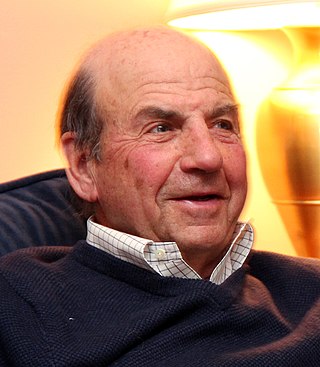
Shekhar Kulbhushan Kapur is an Indian filmmaker and actor. Born into the Anand-Sahni family, Kapur is the recipient of several accolades, including a BAFTA Award, a National Film Award, a National Board of Review Award and three Filmfare Awards, in addition to nomination for a Golden Globe Award.

Henri Cole is an American poet, who has published many collections of poetry and a memoir. His books have been translated into French, Spanish, Italian, German, and Arabic.

Amitav Ghosh is an Indian writer. He won the 54th Jnanpith award in 2018, India's highest literary honor. Ghosh's ambitious novels use complex narrative strategies to probe the nature of national and personal identity, particularly of the people of India and South Asia. He has written historical fiction and also written non-fiction works discussing topics such as colonialism and climate change.

Calvin Marshall Trillin is an American journalist, humorist, food writer, poet, memoirist and novelist. He is a winner of the Thurber Prize for American Humor (2012) and an elected member of the American Academy of Arts and Letters (2008).
Frederick Seidel is an American poet.

Charles Kenneth "C. K." Williams was an American poet, critic and translator. Williams won many poetry awards. Flesh and Blood won the National Book Critics Circle Award in 1987. Repair (1999) won the 2000 Pulitzer Prize for Poetry, was a National Book Award finalist and won the Los Angeles Times Book Prize. The Singing won the 2003 National Book Award and Williams received the Ruth Lilly Poetry Prize in 2005. The 2012 film The Color of Time relates aspects of Williams' life using his poetry.

The Hungry Tide (2004) is the fourth novel by Indian-born author, Amitav Ghosh. Set in the Sundarbans, it follows an unlikely trio who travel up river together to find the rare Irrawaddy dolphin. It won the 2004 Hutch Crossword Book Award for Fiction.

Edward St Aubyn is an English author and journalist. He is the author of ten novels, including notably the semi-autobiographical Patrick Melrose novels. In 2006, Mother's Milk was shortlisted for the Booker Prize.

David Klass is an American screenwriter and novelist. He has written more than 40 screenplays for Hollywood studios and published 14 young adult novels. His screenplays are primarily character-based thrillers for adults, while his novels often tell the stories of teenagers in crisis.

Eliza Griswold is a Pulitzer Prize–winning American journalist and poet. Griswold is currently a contributing writer to The New Yorker and a Distinguished Writer in Residence at New York University. She is the author of Amity and Prosperity: One Family and the Fracturing of America, a 2018 New York Times Notable Book and a Times Critics’ Pick, for which she won the Pulitzer Prize for general nonfiction and the Ridenhour Book Prize in 2019. Griswold was a fellow at the New America Foundation from 2008 to 2010 and won a 2010 Rome Prize from the American Academy of Arts and Letters. She is a former Nieman Fellow and a current Berggruen Fellow at Harvard Divinity School, and has been published in The New Yorker, Harper's Magazine, and the New York Times Magazine.

Sea of Poppies (2008) is a novel by Indian novelist Amitav Ghosh which was shortlisted for the Man Booker Prize in 2008. It is the first volume of the Ibis trilogy. In the words of Rajnish Mishra, "the Ibis trilogy is Ghosh's most vehement indictment of the source of imperialism and colonialism." The second volume is River of Smoke.
The Crossword Book Award is an Indian book award hosted by Crossword Bookstores and their sponsors. The Award was instituted in 1998 by Indian book retailer Crossword with the intention of competing with The Booker Prize, Commonwealth Writers' Prize or The Pulitzer Prize.

The Lost Books of the Odyssey is a 2007 novel by Zachary Mason, republished in 2010. It is a reimagination of Homer's Odyssey.

River of Smoke (2011) is a novel by Indian novelist Amitav Ghosh. It is the second volume of the Ibis trilogy.
The Hindu Literary Prize or The Hindu Best Fiction Award, established in 2010, is an Indian literary award sponsored by The Hindu Literary Review which is part of the newspaper The Hindu. It recognizes Indian works in English and English translation. The first year, 2010, the award was called The Hindu Best Fiction Award. Starting in 2018 a non-fiction category was included.
The Ibis trilogy is a work of historical fiction by Indian writer Amitav Ghosh, consisting of the novels Sea of Poppies (2008), River of Smoke (2011) and Flood of Fire (2015). A work of postcolonial literature, the story is set across the Indian Ocean region during the 1830s in the lead-up to the First Opium War. It particularly focuses on the trade of opium between India and China and the trafficking of girmityas to Mauritius. The series has received critical acclaim and academic attention for its historical research, themes and ambition. A television series adaptation was announced to be in development in 2019.
Maureen McLane is an American poet, critic, and professor. She received the National Book Critics Circle Award.
The Winner's trilogy is a trilogy of young adult fantasy novels by Marie Rutkoski, which includes The Winner's Curse (2014), The Winner's Crime (2015), and The Winner's Kiss (2016), as well as the short story prequel, Bridge of Snow (2014).
Peter Handke is an Austrian novelist, playwright, translator, poet, film director, and screenwriter.

Em and the Big Hoom is a 2012 English-language novel written by Jerry Pinto. The book won The Hindu Literary Prize, the Crossword Book Award, the Sahitya Akademi Award, and the Windham–Campbell Literature Prize.













